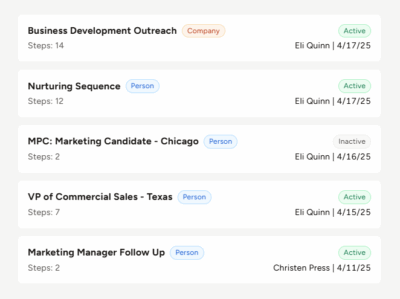I once had an employee who would peak into ecstasy whenever he made a successful cold-recruit call with the candidate agreeing to send in his resume. Then he would plummet to the depths of despair when the resume didn’t come in a few days later.
And when it finally came in, he would peak up again when the candidate showed signs of going forward. But when the client expressed concerns about interviewing, he would fall back down again. But he came back up when he overcame those concerns. It was up and down like this throughout the entire process, and when he had his first deal fall apart, he nearly fell apart along with it.
The recruiting and search profession is the only business where you can experience every single human emotion during the course of an afternoon. The swings are just as great as the income potential in this industry, and if you’ve been in it for more than a month, then I know you have felt it.
If you don’t manage it and if you don’t get control over it, then you’ll either go crazy, get sick, or abandon the business and all the rewards that come with it.
Below are four ways to overcome the “recruiting roller coaster”:
#1—Understand what is really worth getting excited about.
Is it when the candidate sends in a resume? No. That’s expected.
Is it when the client agrees to interview the candidate? No, that just means you’re doing your job.
Is it when the interview goes well? Perhaps a little enthusiasm is good, but don’t go buy a boat just yet. You are only at the first step of deal infancy.
Is it when the candidate gets an offer and says they are going to accept it? Definitely not. Yeah, you can feel some positive feelings about how it’s going forward, but remember we still have the most dangerous part of the process to get through: the resignation and counteroffer.
Is it when the candidate gives their resignation and turns down the counteroffer? No way. People have been known to change their minds at the last minute.
Is it when the candidate shows up for work? Maybe. You can feel good about what you’ve done, but the only time you should get really, really, really excited is after the guarantee period.
Yes, that’s right. Even after the candidate starts and after you’ve been paid, the risk for the deal falling apart does exist. Go ahead and admit it and dole out the appropriate amount of enthusiasm and excitement, but restrain yourself because you can’t predict or control the future.
I think what trips most rookies up in this area is that they really don’t know how fragile deals are and put all their hope and confidence in a place that can’t handle that weight of emotion.
#2—Understand the concept of ratios and probabilities.
From what I’ve seen in the industry, a common standard of interviews to placements is five to one. That means for every five interviews you set up between candidates and clients, you’ll close one deal. So that means if you have four things fall apart, you’re on the right path.
Rejection is the same way. Most people are going to say “No,” but we’re looking for those few “Yeses” out there to complete our business model. Remember that you can’t win every game and you’ve just got to accept the fact that most things fall apart in our world.
Also, if you start seeing weird things happen, it’s a good sign. It means you have enough activity to see screwy things materialize on your desk. When it starts getting weird, it means you’re starting to get good experience.
#3—Manage your emotions.
There’s a concept in the last seven years that has caught on in the business world known as emotional intelligence. This means that you know how to manage your emotions and positively influence the emotions of other people. It starts with knowing how to keep your emotions in a managed state so you don’t spin out of control and turn into a self-destructive mess.
Start with getting a journal. Start writing down your feelings and frustrations, triumphs and tragedies, dreams and disappointments. This will get those emotions to the surface where you can actually deal with them. If you stuff them, you will get sick or go crazy.
For myself, I write in my journal every few days about all the good and bad stuff happening at work and in my personal life. It gives me perspective and allows me to sift through the events of my life so I can draw strength and renewal from them, instead of letting them control me. It brings me to a place of mastery and contentment, where I can look at things from a perspective that is healthy and objective, rather than reacting based on emotion.
Sometimes it might take me a few days to process through an upsetting event, but my journal helps me through it. Journaling is also a great decision-making tool because you can really process through situations and end up choosing the best course of action.
#4—Start an exercise program.
When I was a midshipman at the Naval Academy, one of the coaches told us to break a sweat every day. Spending four years in an environment of structured adversity where stress was deliberately orchestrated, I learned that you have to manage it from a state of peak performance; otherwise you crack. So frequent workouts became a habit a long time ago and have helped me in the stressful job of recruiting.
If you exercise, you are fresh. Our bodies have a way of healing themselves through adversity. If you cut your skin, the scar tissue grows stronger. If you break a bone, the point where the bone broke heals stronger. When you exercise and tear muscles down, they heal and build strength and mass. If you expend energy on the treadmill, you get it back several times over. (Check with your physician if you’ve never exercised, of course.)
If you don’t belong to a gym, invest 30 bucks a month in your health. You’d be amazed by how exercise removes stress and puts energy back into your life.
Remember, recruiting is a game of probabilities, and you never have complete control over the outcome. But you do have complete control over how you respond to situations, and by responding from a position of strength, you can get an edge over them and build your own personal resilience.
— — —
Scott Love, guest writer for the Top Echelon Recruiter Training Blog and owner of The Attorney Search Group, trains, motivates, and inspires recruiters to achieve greatness in the profession. Visit his online recruiter training center for tips, downloads, videos, and articles that can help increase your recruiter billings.








